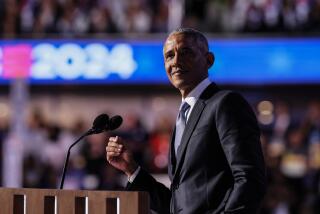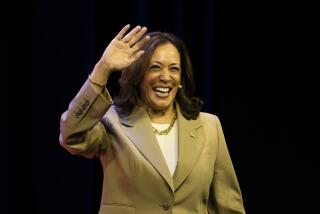THE TIMES POLL : Clinton Faces Optimistic Yet Wary Nation
- Share via
WASHINGTON — It won’t be easy.
That is the ringing message to incoming President Bill Clinton from a new Los Angeles Times Poll.
Clinton assumes the oath of office today buoyed by a wave of personal goodwill from the public--and a widening sense of cautious optimism about the economy.
But he still confronts a country disillusioned about its government’s capacity to lead, divided over the best means of achieving economic prosperity, resistant to several budget cuts and tax increases that Clinton may propose to cut the federal budget deficit--and dubious that the new President can fulfill some of his key campaign promises.
Those doubts are strongest among voters who supported Ross Perot or George Bush last November--the voters Clinton must attract to build a national majority on the foundation of his 43% plurality vote in 1992.
And yet, notwithstanding those divisions, most Americans sail into the Clinton era guardedly optimistic that he can deliver major components of the change he promised during his campaign.
By 57% to 36%, those polled said that they expect Clinton to “work hard to bring fundamental change to the way government is run” rather than “govern in a business as usual manner.” By a more reserved 50% to 36%, those surveyed said that they believe he will “bring about a sustained period of economic prosperity.” And by a margin of 3 to 1, Americans said that they expect 1993 to be a better year than 1992.
“The word I would use to describe the public mood is hopeful--a word that contains its own ambivalence,” said Stanley B. Greenberg, Clinton’s pollster. “People have a good feeling about Clinton and his intentions. But there is a very sober reality about what they think can be done with Congress and the scale of the country’s problems.”
The Times Poll, supervised by John Brennan, surveyed 1,733 adults nationwide from Jan. 14-17; it has a margin of error of plus or minus 3 percentage points.
Overall, the poll sketches the portrait of a nation tentative in its self-assessment as administrations change. Americans appear eager to be optimistic--but uncertain whether circumstances really warrant it.
Last October, in a basic barometer of public opinion, just 22% of the public said that the nation was moving in the right direction; now that figure has increased, but only to a cautious 36%. For much of last year, about three-fourths of those polled said that the nation was on the wrong track; in the new survey that number dropped to 53%.
Assessments of the economy also have brightened--but remain guarded. Last October, just 1 in 10 Americans said that the nation was not in recession; now 1 in 4 respondents said that they believe the recession has ended. The percentage of Americans saying the economy is in serious recession dropped from 46% last October to 27% now; the number of those terming it mild or moderate is virtually unchanged, at 44% now, and 42% last fall.
Probably more than any presidential candidate before him, Clinton based his campaign on reversing the two-decade stagnation in living standards for average families. But just 23% of those surveyed said that they expect living standards to improve for the next generation--virtually identical to last fall. Almost 4 in 10 of those polled said that they expect living standards to decline over the next generation, while just over one-third expect no change.
Attitudes toward government also have improved little if at all since the election. Just 1 in 5 said that they trust the government “to do what is right” most of the time; almost 3 in 5 said that they trust Washington “only some of the time.” For the remaining one-fifth, government “hardly ever” does the right thing. All those numbers closely track findings through the final year of Bush’s presidency.
Against this backdrop of economic uncertainty and political cynicism, the signs of optimism about Clinton stand out like rosebuds in the snow. But they appear almost as fragile.
Clinton’s image has substantially improved since the campaign: As he heads into the Oval Office, 64% of Americans hold a favorable impression of him. Just about one-quarter view him unfavorably--down from about 2 in 5 in October. Those numbers are comparable to Bush’s standing at the outset of his term.
Though the press and some political insiders have criticized the pace of Clinton’s personnel and policy decisions during the transition, the public seems not to mind: Americans approve his transition performance by 65% to 21%. Most think that in selecting his Cabinet he struck the right balance between traditional politicians and outsiders, while devoting the right amount of attention to racial and gender diversity.
Victory has enhanced Clinton’s stature as commander in chief. By a count of 61% to 21%, Americans said that Clinton “can be trusted to handle a major crisis.” By 76% to 18%, they said that they trust Clinton to protect the nation’s security.
Of those polled, 44% said that they have a good idea where Clinton wants to lead the country, while 48% said they do not. While that does not sound like an overwhelming endorsement, four years ago, only 26% of those polled ascribed clear goals to President Bush, while 65% said that he lacked a firm direction.
Opinions diverge on Clinton’s prospects for meeting his ambitious goals. Just 8% of those polled said they believe Clinton will fulfill “many” of his campaign promises, while 53% said that he will meet “some” and 34% said they expect “only a few” to reach fruition.
Already, in fact, the public has absorbed the drumbeat of criticism in the press and Washington about Clinton’s reversal of campaign promises on issues ranging from policy toward Haiti to reducing the White House staff by a fourth. Just 30% of those surveyed said that Clinton is sticking by his campaign pledges; 27% said that he is backing away without good reasons--while an equal number said they agree he is backing away but accept his explanations.
Only a minority would mourn the passing of at least one promise: Just 39% said they would be upset if Clinton drops his proposed middle-class tax cut because of concern about the federal budget deficit. Three in five said that they would not mind. And, although it represents a direct reversal of his campaign trail position, a 51%-41% majority of Americans support Clinton’s decision to maintain the Bush policy of requiring Haitians to apply for political asylum in their own country.
Americans hold substantial expectations that Clinton will produce some tangible changes. By more than 2 to 1, they expect him to produce “significant improvements in the nation’s education system.” By nearly 2 to 1, they believe he will help American industry become more competitive. And, of course, half said they believe he will bring about a sustained period of prosperity.
But, by 53% to 31%, respondents said they doubt that he will “substantially reduce” lobbyists’ influence in Washington and by a 50% to 40% count they said they doubt that he will make “significant reductions” in the deficit. Americans, likewise, divide almost evenly on whether Clinton will be able to meet his pledge to provide affordable health insurance for all.
Since November, Clinton has signaled that he intends to propose sterner measures to reduce the budget deficit than he embraced during the campaign. In broad terms, Americans are already expecting to take a hit: More than 7 in 10 respondents said that to reduce the deficit “people like me are going to have to make some economic sacrifices.” And nearly 6 in 10 said that they expect their taxes to rise under Clinton.
But expectation does not equal enthusiasm: The poll clearly shows that Americans remain ambivalent--if not hostile--toward many of the ideas budget experts consider almost inevitable components of any serious deficit-reduction plan.
Asked if the government should raise the gasoline tax 25 cents over five years to reduce the deficit, 44% said yes and 53% said no.
Asked if the government should impose a national consumption tax to help reduce the red ink, 40% said yes and 52% said no.
Asked if taxes should be increased on the Social Security benefits of middle- to upper-income seniors, just 32% said yes--while 63% said no. (Young voters dislike that idea as much as the elderly.)
Only 30% said the government should spend less on domestic programs.
THE TIMES POLL
Messages for a New President
As Bill Clinton takes office, Americans are happy with his performance so far but split over what he should do now:
Good marks on the handling of his transition . . . Approve: 65% Disapprove: 21% Don’t know: 14% . . . But no consensus on how to boost the economy Cut federal budget deficit: 27% Boost spending on education, research, public spending, etc.: 31% Cut taxes: 25% Other: 9% Don’t know: 8% *
Nation’s Mood: Buoyed, Not Ebullient
Optimism is up since before the election, but most still doubt the nation’s course. The mood is similar to that measured in the month after Ronald Reagan’s inaugural and slightly more dour than when Jimmy Carter took office.
The country is . . .
Jan. Oct. Feb. Feb. 1993 1992 1981 1977 Going in right direction 36% 22% 32% 41% Off on the wrong track 53 70 54 44
*
OPTIMISM ABOUT THE NATION’S COURSE 1993 will be . . . Better than last: 63% Worse: 21% Same: 8% *
BUT DOUBTS LINGER ABOUT THE LONG RUN The next generation’s standard of living will be . . . Better: 23% Worse: 38% Same: 35% *
TRUST IN GOVERNMENT REMAINS LOW Respondents trust in the federal government . . . Always: 1% Most of the time: 18% Some of the time: 57% Hardly ever: 21% *
AND FAITH IN CONGRESS SHOWS NO IMPROVEMENT Confidence in Congress . . . Great Deal: 3% A lot: 8% Some: 42% Very little: 45% Note: Some categories do not add up to 100% because “don’t know” responses were not included. Right direction/wrong track numbers for 1977 and ’81 are from polls by the Roper Organization.
How poll was conducted: The Times Poll interviewed 1,733 adults nationwide by telephone from Jan. 14-17. Phone numbers were chosen from a list of all exchanges in the country. Random-digit dialing techniques were used to ensure that both listed and nonlisted numbers had an opportunity to be contacted. Results were weighted slightly to conform with census figures for sex, race, age, education and household size. The margin of sampling error for the total sample is plus or minus 3 percentage points. For certain subgroups, and for selected questions asked of half of the sample, the error margin is somewhat higher. Poll results can also be affected by other factors such as questions wording and question order.
More to Read
Get the L.A. Times Politics newsletter
Deeply reported insights into legislation, politics and policy from Sacramento, Washington and beyond. In your inbox twice per week.
You may occasionally receive promotional content from the Los Angeles Times.










